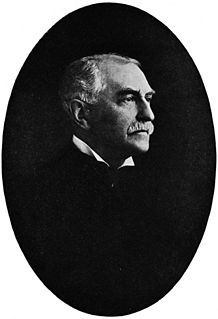A Quote by Samuel Johnson
That eminence of learning is not to be gained without labour, at least equal to that which any other kind of greatness can require, will be allowed by those who wish to elevate the character of a scholar; since they cannot but know that every human acquisition is valuable in proportion to the difficulty of its attainment.
Related Quotes
For now, oh my God, it is to You alone that I can talk, because nobody else will understand. I cannot bring any other man on this earth into the cloud where I dwell in Your light, that is, Your darkness, where I am lost and abashed. I cannot explain to any other man the anguish which is Your joy nor the loss which is the Possession of You, nor the distance from all things which is the arrival in You, nor the death which is the birth in You because I do not know anything about it myself and all I know is that I wish it were over - I wish it were begun.
It is dangerous to explain too clearly to man how like he is to the animals without pointing out his greatness. It is also dangerous to make too much of his greatness without his vileness. It is still more dangerous to leave him in ignorance of both, but it is most valuable to represent both to him. Man must not be allowed to believe that he is equal either to animals or to angels, nor to be unaware of either, but he must know both.
And, inasmuch [as] most good things are produced by labour, it follows that all such things of right belong to those whose labour has produced them. But it has so happened in all ages of the world, that some have laboured, and others have, without labour, enjoyed a large proportion of the fruits. This is wrong, and should not continue. To [secure] to each labourer the whole product of his labour, or as nearly as possible, is a most worthy object of any good government.
Since philosophy is the art which teaches us how to live, and since children need to learn it as much as we do at other ages, why do we not instruct them in it? .. But in truth I know nothing about the philosophy of education except this: that the greatest and the most important difficulty known to human learning seems to lie in that area which treats how to bring up children and how to educate them.
Men agree that justice in the abstract is proportion, but they differ in that some think that if they are equal in any respect they are equal absolutely, others that if they are unequal in any respect they should be unequal in all. The only stable principle of government is equality according to proportion, and for every man to enjoy his own.
The decisions we make, individually and personally, become the fabric of our lives. That fabric will be beautiful or ugly according to the threads of which it is woven. I wish to say particularly to the young men who are here that you cannot indulge in any unbecoming behavior without injury to the beauty of the fabric of your lives. Immoral acts of any kind will introduce an ugly thread. Dishonesty of any kind will create a blemish. Foul and profane language will rob the pattern of its beauty.
As long as mankind is made up of independent individuals with free will, there cannot be any social status quo. Men will develop new urges, and these will give rise to new problems, which will require ever new solutions. Human life implies adventure, and there is no adventure without struggles and dangers.
The moral nature of man is more sacred in my eyes than his intellectual nature. I know they cannot be divorced - that without intelligence we should be brutes - but it is the tendency of our gaping, wondering dispositions to give pre-eminence to those faculties which most astonish us. Strength of character seldom, if ever, astonishes; goodness, lovingness, and quiet self-sacrifice, are worth all the talents in the world.
It is not the actual greatness of national wealth, but its continual increase, which occasions a rise in the wages of labour. It is not, accordingly, in the richest countries, but in the most thriving, or in those which are growing rich the fastest, that the wages of labour are highest. England is certainly, in the present times, a much richer country than any part of North America. The wages of labour, however, are much higher in North America than in any part of England.






































